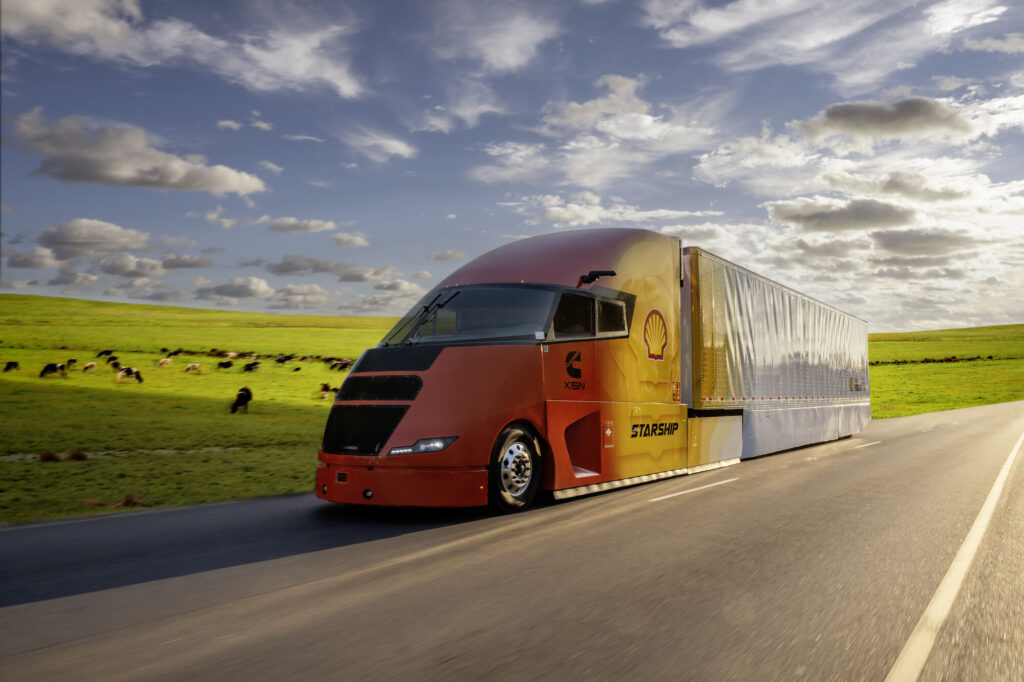Shell Starship 3.0 shows reduction in energy usage and carbon emissions during demonstration runs
“Shell Starship 3.0 demonstrates the power of innovation by incorporating a new natural gas engine complimented by today’s available technologies to help reduce emissions in the road transport industry,”
Shell Starship 3.0 has successfully completed a U.S. West Coast demonstration run to once again, showcase the art of the possible for efficiency and carbon reduction in commercial road transport. This 3rd generation Starship truck, equipped with a Cummins X15N™ natural gas engine and powered by renewable natural gas (RNG), ran a fully loaded trailer on an 840-mile loop throughout California collecting critical performance data.
Shell Starship 3.0, loaded with Shell Rotella engine oil, measured sustainable freight ton efficiency using ton-miles of goods transported per kilogram of CO2 emitted (FTE CO2e). These results were third-party monitored and verified by The North American Council for Freight Efficiency (NACFE), as was done with the first two versions of the Starship demonstrations.
Shell Starship 3.0 completed the demonstration run while operating near the maximum permissible gross vehicle weight of 80,000 pounds for a Class 8 truck. Shell Starship 3.0 achieved improvements over the U.S. average for diesel class 8 trucks[1] of 2.54[2] times better freight ton efficiency (FTE) assessed on a ton-miles per gallon basis and 3.23 times[3] better FTE assessed on a ton-miles per kg of CO2e emitted basis.
The Cummins X15N™ natural gas engine powered by RNG emits less CO2 than a diesel engine and further confirms to fleets the potential for different engine and fuel options to reduce CO2 emissions. RNG is a natural gas transportation fuel that can be derived from organic waste[4] and is interchangeable with Compressed Natural Gas (CNG) and Liquified Natural Gas (LNG) in transport vehicles.
“Shell Starship 3.0 demonstrates the power of innovation by incorporating a new natural gas engine complimented by today’s available technologies to help reduce emissions in the road transport industry,” said Dr. Selda Gunsel, President of Shell Global Solutions and VP Fuels and Lubricants Technology. “Industry collaboration is critical in helping fleets achieve their sustainability goals.”
Similar to its predecessors, the truck also included components and features that promote lightweighting, low aerodynamic drag, and low rolling resistance tires. Shell Starship 3.0 operated using a low-viscosity Shell Rotella natural gas engine oil and Shell Spirax transmission and axle oils. Low-viscosity lubricants require less energy to move throughout the engine while still providing the protection, efficiency, and performance needed in harsh operating environments.
“Each Starship generation shows our current and future customers that we are leading the effort to empower fleets with real-world data that will help guide their decisions to help reduce emissions,” declared Tom Mueller, General Manager of Shell Commercial Road Transport Lubricants. “Shell Starship is a proving ground of how working together across the industry can lead the way to more sustainable solutions.”
Since its start in 2018, the Starship initiative has showcased that innovation and collaboration throughout the transport industry can lead to exceptional results. Collaboration with Cummins for the driveline technology, Bridgestone for high quality tires and Trillium (part of the Love’s family of companies) for renewable natural gas, was vital to the success of the latest Starship.
As Shell works to bring innovation and energy solutions across the transport industry, Shell Starship will continue to collaborate across the industry to push the boundaries of what is possible for a lower carbon future in fleets.
Category: Cab, Trailer & Body, Cab, Trailer & Body New, Driver Stuff, Electric Vehicles, Equipment, Featured, Fuel & Oil, General Update, Green, News, Products, Tech Talk, Vehicles











